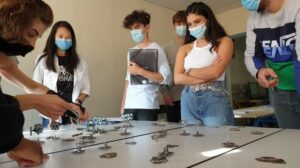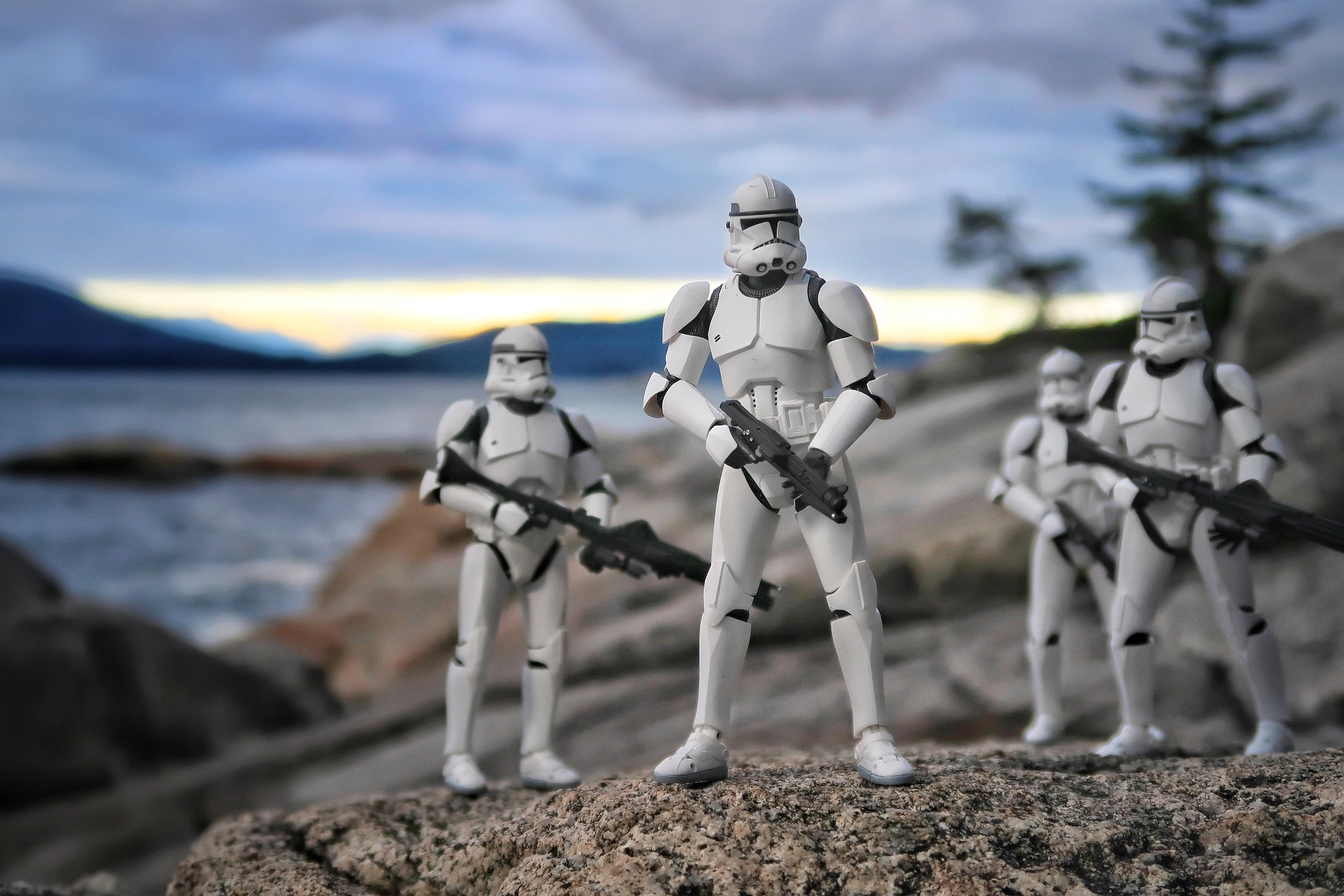Citation
Les auteurs
Antoine Bourguilleau
(antoine.bourguilleau@univ-paris1.fr) - Université Paris 1 Panthéon-SorbonneNatalia Wojtowicz
(n.h.wojtowicz@hhs.nl) - (Pas d'affiliation)Philippe Lépinard
(philippe.lepinard@u-pec.fr) - Institut de Recherche en Gestion (IRG, EA 2354)
Copyright
Déclaration d'intérêts
Financements
Aperçu
Contenu
The beginning of wargaming and field exercises can be traced back to sandboxes with formations of moved to see the dynamics. Those wargames involved moving elements through terrain and seeking out scenarios that tested competence of the commander and subordinant units. The figurines of fusiliers, husars and artillery replaced chess queens and kings in representing the strenght and weakness of the armed forces. Progressively, to this heuristic frame, a stochastic dimension was added, with the use of dice to randomise the combat results (fire, melee, or morale). Uncertainty of the dice represented the unknown factors, which Clausewitz called “The Friction”. (Bourguilleau, 2020)
As it became more “realistic” with the addition of many factors and data, it became less entertaining and more analytical : system became more important than game. Kriegsspiel became an exercise, all the more complex for its participants trading the precision for an opened question, letting the player use their imagination to link the dots. The demand on player’s competence was also raised due to evolving nature of war and developments in wargames – from gladiators to gigabytes (Van Creveld, 2013) – from infantry to cyber capabilities. Wargaming has also become a global phenomenon with the introduction of literary works of Robert-Louis Stevenson and H.G. Wells and commercial roleplaying games, such as Dungeons and Dragons created by Dave Anesen and Gary Gygax (Peterson, 2012).
Those cultural manifestation of wargaming became a gate-way to the system analysis by introducing rules, laws and logis that allows players to do difficult things in order to attain their goals. The environment can be supportive of representing complex systems : not only military, but also academic and economic problems (Wojtowicz, 2020a). Within the experimental setting of the wargame, the time cycle, resources and strategies can be reproduced. The method has originated in the armies, but in the last 50 years became increasingly applied to other disciplines. Developments in applying the methodology led to new formulations, such as business wargaming (Kurtz, 2003). The following article outlines the role of context in training with wargaming and its use in varied audiences.
Experience brought by wargames includes decision-making in a changing environment, planning and modifying plans, coordinating efforts, understanding the power and the limits of any chain of command. And all the things learned in a game can be transposed into real life, even if the game is set in a fictional environment. As shown in the experiments conducted in NATO and IAE Gustave Eiffel, the level of realism in wargames can be tailored to the audience receiving training in management.
The authors argue that wargaming is an efficent method of training, but the role of context is changing depending on the participants. For students of management studies, the de-contextualization is beneficial, whereas for the military officers training it is crucial to understand problems directly in their area of expertise.
Using wargaming as a training method outside of military requires the students to look past the initial impression and test their assumption about the context of play. Context of wargaming in learning situation can consist of three elements: the cultural understanding of the game (how it represents the system or situation), the teacher’s explanation of the wargame (how it is presented to the students) and the student’s impressions (how it is received). The level of provided context in a learning situation can determine the effects achieved in classroom. After a presentation of the professional and playful history of wargames, the following paper reports two examples: of high context wargaming and the second of decontextualized learning. Both can be used to shape the learning experience and link the design format to the planned learning outcomes.
As part of some management courses since 2019 within the IAE Gustave Eiffel (university school of management of the university paris-Est Créteil, UPEC) various public-sector table-top wargames have been used in addition to more classical experiential educational devices (business games, simulations of management situations, etc.). This work is part of the EdUTeam educational and research project (https://eduteam.fr/) which aims to study the benefits of diverting games for training purposes. The choice of wargames follows a work concerning table-top role-playing games started in 2018 in order to propose to entire classes an experiential tool retaining the same logic of malleable scenarios according to the expected pedagogical progression. Moreover, our definition of wargame is based on this scenaristic approach generating managerial situations: a wargame is « a catalyst artifact to create realistic managerial situations through a system of rules, scenarios and materials (counters, maps, figurines, etc.) and representing a historical or fictitious environment that is generally in opposition to each other in a manner asymmetrical, several teams: either a team of students against a team of antagonists managed by a master of the game or directly several teams between them » (Lépinard, 2020a).There are many formats of wargames, which can be used for training. We opted for the hex & counters (pieces that are placed on cards with hexagon overlays) and the figurine wargames (Figure 1).

Figure 1. Two teams compete with X-Wing The Miniatures Game from Fantasy Flight Games during a session dedicated to the study of managers’ skills in the 2nd year of Bachelor.
Beyond the experiential and playful dimension, the implementation of these wargames is linked to the central concept of decontextualization that we study according to two complementary axes: decontextualization as an experimental learning space connecting contextualized theoretical and practical teachings and decontextualization as the first step in an educational progression from the strongest decontextualization to the strongest contextualisation of learning situations. In both cases, we believe that educational devices based on wargames contribute positively to the design of an inclusive educational strategy. Indeed, in a recent article (Lépinard, 2020b), we found that fictional universes greatly reduce cognitive routines, pedagogical and organizational of students that prevent them from really engaging in learning situations close to real managerial situations. Looking for an advanced realism in the early stages of managerial training blocks many learners, whether because of rather introverted temperaments or, quite simply and logically, by lack of knowledge or experience. The imaginary (and even historical) worlds of wargames then propose a cognitive decentralization that allows a real letting go and therefore an authentic commitment of the participants. Complemented by a benevolent framework (assessment on commitment and not on results) and structured debriefings, the pedagogical system then becomes a decontextualized and inclusive experimental learning space that fits well into learning spaces that are oriented either towards the acquisition of theoretical knowledge or towards the development of practical skills (Table 1).

Table 1. Decontextualized experimental learning spaces.
Beyond this static vision of an experimental learning space, it is also possible to approach the concept of decontextualisation dynamically and longitudinally by integrating it into an educational progression. To do this, we propose a four-time continuum allowing us to move from highly decontextualized wargame universes to managerial situations anchored in our real world (Table 2). The acquisition of knowledge and the development of skills are progressive and allow all participants to actively engage in the learning process; the mobilization of managerial skills is cumulative and freed from possible obstacles in the face of managerial situations that are too complex to manage for apprentice managers.

Table 2. Decontextualization Continuum – Contextualization of learning situations.
On the other side of the spectrum of contextualization, the wargames introduced to NATO officers in order to train managerial skills, have proven the need to place the educational experience closest to the to the professional problems of military. The question of required level of context that facilitates most effective learning has been asked in development of NATO training (Wojtowicz, 2020b). In order to teach officers the competence of communication and liaison a wargame has been tested with three different scenarios : one historical, one ficticious and one real. In all cases, the tasks were the same (managing a team, negotiation, information collection and communication). The component that changed was context.

Figure 2. NATO training in negotiations. Two teams discuss possible agreement leading to deescalation and successfully managed incident.
Recorded learning outcomes have been the highest for the realistic scenario, which can be explained by students paying more attention to urgent and relatable problems. Growth in competences is facilitated due to context strongly linked with potential scenarios emerging in the participant’s field of expertise. wargaming as a learning situation has proven to be conditioned by translation of the outcomes into a real-world consequences (for example, losing a negotiation can cause lack of access to a given area). Further inquiry could be proposed for the benefit of abstraction and trade-off in terms of context and competences. The differences in reached learning objectives are sampled in table 3.

Table 3. Summary table.
Given the differences in high and low context learning, the experimental approach to choosing the right level of contextualization provides the most dependable results for the target audience. Within the military community, the applicability takes precedence over multiplicity. Contrary to this observation, within management students, the broader focus and flexibility is valued higher. The two examples represent two extremes of the contextualization axis and can be viewed as cases that illustrate dilemmas in design process of learning experience. The history of wargaming is filled with developments of new formats supporting training, including in disciplines outside of military. The comparison of the audiences and effectiveness of wargames in management training provides both a developing method and the way of analyzing the context level required to achieve the learning outcomes.
Early professional wargaming failings were the consequence of a false assumption: that the more complicated, the more realistic the game and the findings of the game, when all the studies on the use of wargames precisely show the opposite: a good wargame is, above all a good balance between realism and abstraction, playability and constraint; a general frame for all the players to go ahead, test their strategies make mistakes and, above all, adjust to the actions of other actors. But in any case, the best option remains simplicity. A good game rewards sound (and usually simple) strategy, not mastery of the rules themselves. The rules should never interfere with the ideas of the players. This is the clear lesson of nearly two centuries of wargaming practicing, for the military, the manager and the over-educated – who can be the same person.
Bibliographie
Barritt, L. (1986). Human Sciences and the human image. Phenomenology and Pedagogy, 4(3), 14-21.
Bourguilleau, A. (2020). Jouer la Guerre – Histoire du wargame. Paris : Passés/Composés.
Dunnigan, J.F. (2000). Wargames Handbook, 3rd ed, How to play and design commercial and profession,nal wargames. Lincoln : iUniverse.
Kurtz, J. (2003). Business wargaming: simulations guide crucial strategy decisions, Strategic Leadership, 31(6), 12-21.
Lépinard, P. (2020a, juin). Situation-problème didactique à base de wargames : le cas de l’enseignement de la gestion de projet de systèmes d’information en École Universitaire de Management. Paper presented at 25ème Conférence de l’Association Information & Management, En ligne.
Lépinard, P. (2020b, juin). La décontextualisation par le jeu des situations d’apprentissage simulées comme stratégie pédagogique inclusive. Paper presented at XXIXe Conférence Internationale de Management Stratégique, En ligne.
Peterson, J. (2012) Playing at the World (beverley Hills, CA: Unreason)
Wojtowicz, N. (2020a). Resilience against intentional shocks: a wargaming study of the relation between space, action and the residing population to resilience. Eastern Journal of European Studies, 11(1), 5-32.
Wojtowicz, N. (2020b). Wargames Experiences: Soldiers, Scientists and Civilians. Delft: J10 Gaming.
Van Creveld, M. (2013). Wargames: From Gladiators to Gigabytes. Cambridge: Cambridge University Press.
